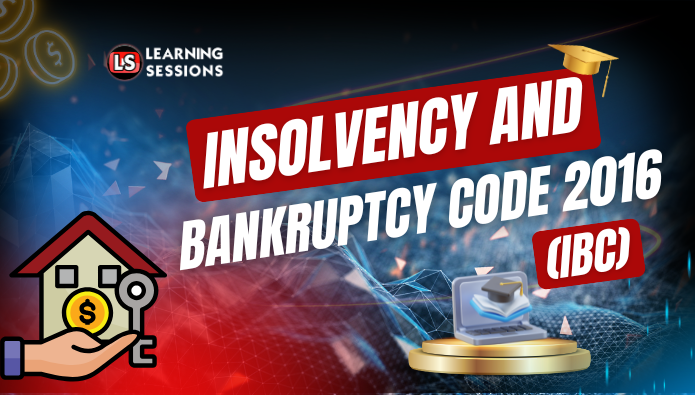Ever wondered what happens when a company fails to repay its loans?
Do you often find terms like insolvency, bankruptcy, liquidation, or IBC confusing?
If you’re preparing for the CCP Exam, or working in the banking sector, this video is a goldmine of practical knowledge! 🌟
In this session, we decode the Insolvency and Bankruptcy Code (IBC) 2016 – starting from its core meaning, to understanding legal proceedings, resolution vs. liquidation, the four powerful pillars of IBC, and the game-changing Pre-Packaged Insolvency Process (PPIRP) designed for MSMEs.
✅ Ideal for:
- Banking aspirants
- CCP exam takers
- Finance professionals
- Students curious about corporate law & insolvency
So, hit the play button, and don’t forget to drop your thoughts or doubts in the comments below. Let’s make learning interactive! 👇👇
🎥 Watch the Video
👉 Before we dive in, watch this video for a complete breakdown:
🧠 What is Insolvency and Bankruptcy?
Insolvency: A condition where a person or company is unable to pay debts on time.
Bankruptcy: A legal declaration of insolvency by a court.
Example: ABC Ltd defaults on a ₹50 lakh loan → Insolvent → Court declares → Bankrupt
📜 Purpose of the Insolvency & Bankruptcy Code (IBC)
- Streamline and fast-track insolvency cases
- 180-270 day time-bound resolution
- Focus on reviving businesses before liquidation
🏛 Applicability of IBC
- Companies (Companies Act 2013)
- LLPs
- Individuals & partnership firms
- Notified bodies
Not applicable to: Banks, FIs, Insurance Cos
🧱 4 Pillars of IBC
1. Insolvency Professionals (IP)
Manage the company, assets & resolution/liquidation process.
2. Information Utilities (IU)
Maintain electronic records like NeSL.
3. Adjudicating Authorities
- NCLT → Companies & LLPs
- DRT → Individuals & firms
- Appeals: NCLAT → Supreme Court (on legal issues only)
4. IBBI
Regulatory authority for entire process.
⚖️ Corporate Insolvency Resolution Process (CIRP)
Can be initiated by: Financial Creditor, Operational Creditor, Corporate Debtor
- Resolution Phase: Revival attempt
- Liquidation: Sale of assets if revival fails
🧾 CIRP Workflow Highlights
- Default ≥ ₹1 crore
- IRP appointed within 14 days
- CoC formed, votes with 66% majority
- If plan fails → Liquidation
💧 Liquidation Waterfall – Payment Priority
- IBC & liquidation cost
- Workmen wages (24 months)
- Secured creditors (if rights given up)
- Employee dues (12 months)
- Unsecured creditors
- Government dues
- Shareholders (Preference → Equity)
🔄 Voluntary Liquidation
When company wants to shut operations without default. Needs director’s declaration & 2/3rd creditor consent.
🛠 Major IBC Amendments
- IBC starts on NCLT admission date
- Section 32A: New owners not liable for past fraud
- Section 29A: Related party voting relaxed
- Section 66: Fraud prevention
- PPIRP introduced for MSMEs (default ₹10 lakh)
[FREE PDF] CCP | Resolution of Stressed Assets | Chapter 26 | Part 3
🧩 What is Pre-Packaged Insolvency Resolution Process (PPIRP)?
- Applies only to MSMEs
- Default threshold: ₹10 lakh
- Initiated by debtor only
- Existing management continues
- Flexible, fast, cost-effective
🔁 PPIRP vs CIRP – Quick Comparison
| Feature | CIRP | PPIRP (MSME) |
|---|---|---|
| Applicability | All companies | MSMEs only |
| Default Threshold | ₹1 crore | ₹10 lakh |
| Initiated by | Creditors or Debtor | Debtor only |
| Management Control | With IRP | With Debtor |
| Court Involvement | High | Limited |
| Liquidation (No Plan) | Mandatory | Not Automatic |
📥 Download PDF Notes
Click below to download the complete session PDF with flowcharts and bilingual notes:
✅ Conclusion
We hope this breakdown of the Insolvency and Bankruptcy Code (IBC) helped clear your concepts and doubts.
- IBC = Revival > Liquidation
- Time-bound resolution builds lender confidence
- PPIRP is a game changer for MSMEs
If you found this useful:
- Comment your feedback or questions
- Share with friends preparing for CCP
- Subscribe to our channel & turn on notifications 🔔
Also Like:





